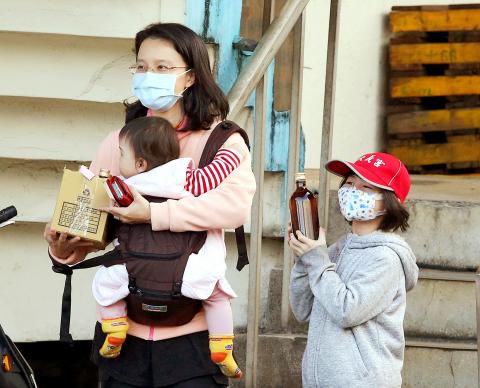The Executive Yuan has instructed state-run Taiwan Tobacco and Liquor Corp (TTL) and Taiwan Sugar Corp (Taisugar) to increase their production lines for 75 percent alcohol, hoping to fix a lack of stock by this week amid fears over the 2019 novel coronavirus (2019-nCoV).
The coronavirus has led to a shortage of surgical masks and alcohol-based sanitizers containing at least 75 percent alcohol in Taiwan, with media reports that some people have been stealing from hospitals after failing to purchase sanitizers.
TTL management said that its staff have been working around the clock since the end of the Lunar New Year holiday.

Photo: CNA
To meet rising demand, the Executive Yuan has instructed the two state-run manufacturers to increase production lines for 75 percent alcohol, on top of their existing production lines for 95 percent alcohol.
For every 10 bottles of 95 percent alcohol produced, 13 to 15 bottles of 75 percent alcohol could be made, which would rid customers of the need to dilute, said a TTL manager who asked to remain anonymous.
Producing more bottles would mean that more people could buy them, the manager added.
A Taisugar manager said that the company only has one production line for 95 percent alcohol.
It would consider outsourcing the production of 75 percent alcohol and is planning later this month to ship 200,000 to 300,000 350ml bottles, the Taisugar manager said.
TTL is to start production of 75 percent alcohol at its factory in Pingtung County, followed by another three to four factories across Taiwan, depending on how the situation develops, said a second TTL manager, who also asked to remain anonymous.
To ensure availability, TTL would produce 330ml, 110ml and 60ml bottles of 75 percent alcohol, with the first batch expected to be delivered by its Pingtung factory today, the second TTL manager said, adding that production capacity is 2,000 to 3,000 dozen bottles per day.
Taisugar and TTL promised to sell 75 percent alcohol at an affordable price, adding that factories would not cease production, so there would be no need to stock up on the product.
More than 8 million additional bottles of alcohol-based sanitizers are expected to enter the market this week, the state-run manufacturers said.
Separately, Minister of Economic Affairs Shen Jong-chin (沈榮津) on Thursday said that the nation was producing 3.2 million surgical masks per day, but hopes to boost the figure to 3.9 million this week and 4.6 million next week.
The Executive Yuan on Jan. 31 also approved a plan to build 60 production lines to make an additional 6 million masks per day to meet demand.
Adding the projected capacity of 4.6 million masks per day, that would eventually bring total production to more than 10 million masks per day, hopefully by early next month, Shen said.

Taiwan would welcome the return of Honduras as a diplomatic ally if its next president decides to make such a move, Minister of Foreign Affairs Lin Chia-lung (林佳龍) said yesterday. “Of course, we would welcome Honduras if they want to restore diplomatic ties with Taiwan after their elections,” Lin said at a meeting of the legislature’s Foreign Affairs and National Defense Committee, when asked to comment on statements made by two of the three Honduran presidential candidates during the presidential campaign in the Central American country. Taiwan is paying close attention to the region as a whole in the wake of a

Chinese Nationalist Party (KMT) Chairman Eric Chu (朱立倫), spokeswoman Yang Chih-yu (楊智伃) and Legislator Hsieh Lung-chieh (謝龍介) would be summoned by police for questioning for leading an illegal assembly on Thursday evening last week, Minister of the Interior Liu Shyh-fang (劉世芳) said today. The three KMT officials led an assembly outside the Taipei City Prosecutors’ Office, a restricted area where public assembly is not allowed, protesting the questioning of several KMT staff and searches of KMT headquarters and offices in a recall petition forgery case. Chu, Yang and Hsieh are all suspected of contravening the Assembly and Parade Act (集會遊行法) by holding

PRAISE: Japanese visitor Takashi Kubota said the Taiwanese temple architecture images showcased in the AI Art Gallery were the most impressive displays he saw Taiwan does not have an official pavilion at the World Expo in Osaka, Japan, because of its diplomatic predicament, but the government-backed Tech World pavilion is drawing interest with its unique recreations of works by Taiwanese artists. The pavilion features an artificial intelligence (AI)-based art gallery showcasing works of famous Taiwanese artists from the Japanese colonial period using innovative technologies. Among its main simulated displays are Eastern gouache paintings by Chen Chin (陳進), Lin Yu-shan (林玉山) and Kuo Hsueh-hu (郭雪湖), who were the three young Taiwanese painters selected for the East Asian Painting exhibition in 1927. Gouache is a water-based

President William Lai (賴清德) has appointed former vice president Chen Chien-jen (陳建仁) to attend the late Pope Francis’ funeral at the Vatican City on Saturday on his behalf, the Ministry of Foreign Affairs said today. The Holy See announced Francis’ funeral would take place on Saturday at 10am in St Peter’s Square. The ministry expressed condolences over Francis’ passing and said that Chen would represent Taiwan at the funeral and offer condolences in person. Taiwan and the Vatican have a long-standing and close diplomatic relationship, the ministry said. Both sides agreed to have Chen represent Taiwan at the funeral, given his Catholic identity and